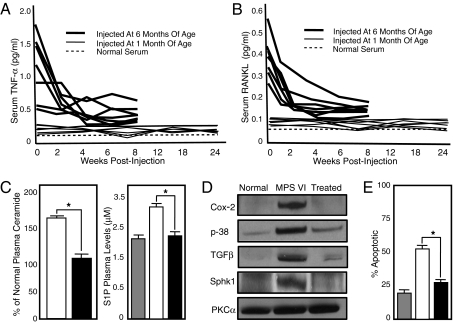Fig. 4.
Six-month-old MPS VI rats (n = 7) with advanced bone disease and 1-month-old presymptomatic MPS VI rats (n = 7) were injected i.v. with 3 mg/kg of Remicade every third day for 8 weeks in the older animals and 24 weeks in the younger group. Serum was collected every 2 weeks in the treated animals. (A) Remicade treatment prevented the elevation of circulating TNF-α in the presymptomatic group, although the levels were normalized in the animals with advanced disease. (B) Similar response was seen in serum RANKL levels, indicating that inhibition of TNF-α was having downstream effects. (C) Ceramide and S1P plasma levels were measured in normal (gray bar), untreated 8-month-old MPS VI (white bar), and MPS VI rats that were treated for 8 weeks beginning at 6 months of age (black bar). Note the reduced levels of both bioactive lipids in the MPS VI-treated animals. (D) Posttreatment, FLSs were isolated from the MPS VI rats as well as age-matched normal and untreated MPS VI animals. The expression of two molecules that are activated by TNF-α, cyclooxygenase-2 (COX-2; 73 kDa) and p38 (38-kDa), were examined by Western blot analysis. Note that the levels of both proteins were normalized in the treated MPS VI cells. In addition, the expression of TGF-β (30 kDa) and Sphk1 (54 kDa) were normalized in the treated animals. Protein kinase C-α (82 kDa) was used as a loading control. (E) Apoptotic (TUNEL) staining of articular cartilage was performed after 24-week treatment in MPS VI animals. Two hundred cells were counted per animal. Fifty-five percent TUNEL-positive cells were found in the untreated animals (white bar) vs. 29% in the treated animals (black bar). *P < 0.01. The differences between normal (gray bar) and treated MPS VI rats were not statistically significant.

